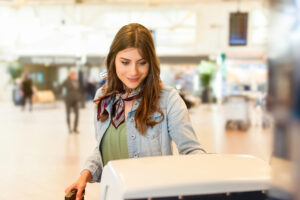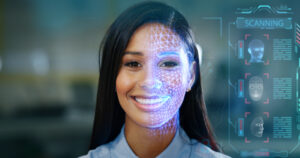Why Hotels Should be Investing in Self Check-in Technology
Self-service hotel technology became more prevalent as a result of the COVID-19 pandemic and has now become an important part of the guest experience. A 2020 survey conducted by Skift, and Oracle Hospitality found that 71% of travelers were more likely to stay at hotels with self-service technology. A separate Deloitte study reported that 60% of travelers preferred a hotel that offered contactless self check-in and keyless room entry. Consumers also want limited interaction from their hotel stay, a May 2020 Medallia Zingle report, found that 87% of U.S. consumers wanted companies to continue to offer options that limited in-person service. And 77% felt that the level of in person interaction would dictate which companies they conducted business with. Self-service technology is in demand, according to an analysis conducted on behalf of Marriott, social media posts that included “self-service” had increased by 170% year-over-year from 2019 to 2020.
Interested in Upgrading Your Hotel Technology?
Zoox Pass for Hospitality
International technology solutions provider, Zoox Smart Data launched Zoox Pass to help hotels meet the demand for self-service technology by offering guests a seamless and personalized self check-in service. The Zoox Pass self check-in technology allows guests the option to authenticate their identities using their personal devices or by using the Zoox Pass kiosk. Guests can check-in 24/7 using the kiosk, the facial recognition feature instantly recognizes guests and retrieves their information to enable a seamless check-in. The self check-in kiosks remove the need for guests to manually enter their information by enabling the scanning of guest documents and identification cards. Zoox Pass seamlessly integrates into the hotel’s existing systems and allows guests to choose guestrooms based on their current availability. The small design gives hotels the option of placing the kiosks on desks and in other convenient areas.
Hotels can take the guest experience to the next level by pairing Zoox Pass with the Zoox Smart Data Platform to locate guest profiles in order to analyze guest preferences. Once guests connect to the hotel’s WIFI network or to a Zoox hot spot, hotels can gather data regarding guest room preferences, meal preferences and other hotel activities in order to offer a more personalized guest experience. Guests who are concerned with their privacy can opt out of the facial recognition service and still benefit from the other Zoox Pass identification features. Guests can also choose to opt out of using the Zoox Pass service entirely.
“The hospitality industry is seemingly at a crossroads where hoteliers are now expected to provide swift service while taking the time to ensure a personalized experience,” stated Zoo Pass, “By combining the advantages of facial recognition and big data, Zoox Pass ensures that hotels don’t have to choose one vital aspect of ensuring guest satisfaction over the other. We look forward to seeing the solution in action as it provides industry professionals with the means to deliver unmatched service quality that meets every expectation, while also maximizing a hotel’s ability to increase revenue.”
NOBAL’s Interactive iMirror
Self-service hotel technology is in demand and there are many solutions on the market that allow hotels to meet that demand. NOBAL Technologies created the Hospitality iMirror, an interactive mirror that allows self check-in and self check-out in the hotel lobby. Guests can also use iMirror to browse onsite restaurants, to make reservations and take selfies that can be uploaded to social media. iMirror self-service technology can also be used to enhance the guest room experience by allowing guests to order room service, to book spa appointments, to purchase event tickets and to request rides from their guest rooms. iMirror also has payment capabilities that guests can use to pay for all their hotel experiences.
NOBAL’s iMirror technology can also be used to improve the efficiency of the hotel operations by sending restocking notifications, housekeeping requests, lighting and HVAC control and reservation maintenance. Hotels can use iMirror to expose guests to restaurants, events, gift shops and other revenue generating services.
The self-service solution also allows hotels to capture user data that can be used for marketing purposes. According to NOBAL CEO Bill Roberts, “The iMirror’s software captures all user data, which can be anonymized and analyzed to reveal data trends, which, in turn, can be used to create targeted marketing campaigns to further enhance revenue streams flowing to the property.” “Our goal is to redefine the experience of what it means to stay at a hotel. We’re forging a new path for hoteliers and their guests worldwide. Wherever and whenever innovation crosses paths with hospitality, we want to be there.”
How Can Hotels Benefit from Self Check-in Solutions?
According to a report by McKinsey, businesses could free up 69% of their time by automating data processing duties. Self- service kiosks could automate tasks normally performed by front desk staff, such as recording guest information and taking payments. Self check-in systems reduces overcrowding at the front desk and communal areas and allows staff more time to dedicate to other duties. Self check-in solutions simplify the check-in process and reduces the amount of time guests spend waiting in line, filling out paperwork and verifying their identity. Self-service kiosks are linked to the hotel’s PMS and therefore can be used to gather useful data about guest purchases, guest room preferences and special requests, that allow hotels to deliver a more personalized experience. The Hospitality Industry is facing a major labor shortage and self check-in technology can have an impact on employee satisfaction, a 2019 report by Starfleet Research and Oracle Hospitality, found that 86% of hoteliers agreed that artificial intelligence improved employee satisfaction and 89% of executives said that artificial intelligence has also reduced their hotel’s operating costs.




